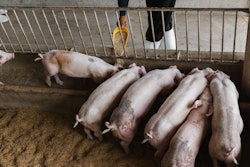
Although outbreaks have fallen to relatively low levels, African swine fever continues to inflict losses on Asia’s wild and domestic pig populations.
Over the past two weeks, the Philippine News Agency (PNA) has reported the spread of African swine fever (ASF) in parts of Iloilo province in the Western Visayas region.
The first community to be affected was Oton, where a state of calamity has now been declared in the town. As cases have been detected in 23 villages in the area, 600 pigs have already been culled. In nearby San Miguel, pigs have been culled as a result of infections in two villages. Latest reports indicate suspicions of ASF in a third community in the province, where pigs died suddenly. The village has not been officially identified in order to avoid panic among its residents.
Meanwhile, Zamboanga City remains in the ASF “red zone,” where there are ongoing outbreaks, according to the same source. In this part of western Mindanao, pig mortalities have passed 4,300. So far, cases have occurred in 34 of the region’s 98 communities.
Across the Philippines, PNA reports that disease controls are being stepped up in order to prevent the return of ASF.
Also carrying the responsibility as chief of the national Department of Agriculture, President Ferdinand R. Marcos is closely involved in ASF management in the Philippines. Over the past two weeks, PNA has reported the president’s latest orders for all pig breeding sites in the Western Visayas region to be tested for ASF. To reduce the risk of further spread, he has banned all outgoing trade from two provinces in this region for a period of 60 days.
Meanwhile, the head of the national ASF task force has called for more surveillance of pigs in non-infected areas, as well as prompt reporting of any suspicious pig deaths.
In those areas now free of the disease, government funding is helping support the restoration of pig production. Over the past few weeks, PNA reports that three provinces have received sums totaling PHP20.5 million (US$348,000) for these new schemes. These will be used to construct modern, efficient and biosecure pig housing, and to purchase initial groups of healthy animals, feed and medications under the National Livestock Program’s INSPIRE scheme.
Further outbreaks in Malaysia
Malaysia’s animal health agency had recently notified the World Organisation for Animal Health (WOAH) of four more ASF outbreaks in Eastern Malaysia.
Between early March and the end of July, 110 pigs were affected by these outbreaks, including 36 deaths. Three of the farms were in Sabah, and one in neighboring Sarawak — both states on the island of Borneo. Each herd comprised between five and 60 pigs.
Since ASF was first detected in this region in February 2021, 73 outbreaks have been registered with WOAH. Affected have been around 4,200 domestic swine and 72 bearded wild pigs.
In mid-October, The Borneo Post reported that some pig carcasses illegally dumped had tested positive for the ASF virus. Around 20 animals had been illegally buried in the Bau district of Sarawak in Eastern Malaysia. Checks were carried out at three pig farms nearby. A resident told local media that the district’s pig population had been wiped out by disease.
With the first cases confirmed in November 2021, there have also been outbreaks in several Western Malaysian states. Also affecting wild pigs, the most recent cases to be reported in domestic animals in this region were in April.
Further outbreaks in Nepal
For Nepal, confirmation of three new ASF outbreaks brings the country’s total since its first cases in March to 27. Directly impacted have been more than 19,000 pigs, including around 15,800 mortalities.
Starting between early June and the end of August, two of the latest outbreaks reported to WOAH were in Koshi in the Eastern region, and one was in Bheri in the Mid-Western region. All the premises are described in the report as farms. However, one in Koshi had 8,120 pigs — all of which died — while the others had 29 and 110 animals.
ASF return suspected in Myanmar
Since the end of September, more than 100 pigs have died at Hakha in Chin state, reports BNI Online.
With symptoms including difficulty eating, lethargy, constipation and mortality of around 50%, the cause of death is now investigation. However, the source reports a suspicion of ASF as Chin is in the west of Myanmar, and borders India’s Mizoram state, where more than 40,000 pigs have died of this infection over the past 18 months.
In 2020 and 2021, WOAH was notified of ASF outbreaks in three herds of domestic pigs in two other states of Myanmar, Sagaing and Shan. Both outbreak series were declared “resolved” by the authorities only last month.
Ongoing ASF situation in Vietnam
Since the country’s first ASF cases in February 2019, there have been outbreaks in all 63 of the province/city regions of Vietnam. This is according to information from the agriculture ministry cited by the United Nations’ Food and Agriculture Organization (FAO).
As of the end of September, outbreaks were considered to be ongoing in 20 provinces. This far fewer than in previous years. However, sharp spikes in the number of affected communities have occurred during the months of October and November in 2020 and 2021, and so a critical period lies ahead for Vietnam’s ASF control efforts.
Movements of live pigs are now banned from crossing provincial borders without veterinary certification, reports VietnamNet. Coming into effect one month ago, the need for this documentation further increases producers’ costs.
Taiwan takes position on ASF vaccination
Despite the risk of ASF entering the territory, Taiwan will not import ASF vaccine until a product has been approved by WOAH as safe and effective.
At the end of October, this policy was confirmed by the Council of Agriculture Minister to the legislature’s Economics Committee. This was in response to an inquiry about the prospect of the territory’s government using an ASF vaccine, which was developed in Vietnam and recognized by the U.S. Department of Agriculture, reported Taipei Times.
One month previously, authorities in Vietnam announced the result of an investigation into a previous test of a new ASF vaccine. Tests were concluded ended early due to high mortality among the trial pigs. Investigators revealed that administration of the vaccine during field trials was “out of compliance with guidelines.”
In recent weeks, multiple threats of ASF entering Taiwan were illustrated. As well as an ASF-infected pig carcass washed up on Taiwan’s shore, several ships carrying illegal pig meat to the territory were intercepted and refused entry.
Smuggled pork found in Thailand airport search
At Thailand’s main international airport, a sniffer dog recently found 9 kg of pork sausages in an incoming passenger’s baggage. According to Bangkok Post, the traveler was attempting to bring the meat illegally into the country from Vietnam.
As one of the measures to prevent the entry of ASF, there has been a ban on imports of meat into Thailand since 2015, unless accompanied by an appropriate permit. If the disease gained a foothold, it could cause severe damage to the country’s pig industry, and to the national economy, according to this source.
Since November 2021, ASF has been detected in pigs at 97 Thai locations, according to official WOAH notifications. Although these outbreaks occurred in 32 provinces in all six regions of the country, cases have so far been reported only in village herds, and not on commercial farms.
Recently, WOAH received notification from the Thai authorities of two new outbreaks confirmed in mid-October. Reported were a total of two deaths and two culls among village herds in lower northeastern and southern Thailand.
ASF ‘resolved’ in Timor-Leste
An ASF outbreak series beginning in September 2019 has been brought under control in Timor-Leste (East Timor), according to a notification to WOAH.
By the last outbreak in December of that year, it was reported that 405 pigs had died of the disease. Initially affected was a cluster of around 100 backyard herds near the capital, Dili. However, the infection spread over most of the island, affecting the livelihoods of around one-third of pig-owning families. According to the report, losses of pigs were estimated at between 70,000 and 150,000. These were out of a total population of 400,000.
For 19 months up to October 2021, no cases were detected in the country. This was followed by a resurgence at four locations in the north of the island, where all 100 pigs died of ASF.
Since February, there have been no further cases, according to the official report. As a result of these experiences, local veterinarians have a better understanding of the disease. They are also able to respond more quickly in case of any future outbreaks.
Disease situation elsewhere in Asia
Since ASF was first detected in Asia in 2018, cases have been recorded in 17 countries in the region, according to the FAO.
From South Korea, Pig People reported on November 2 that ASF outbreaks totals stand at 2,679 in wild boar, and 27 in domestic pigs. While there has been no change in farm outbreaks, cases in wild boar have increased by 18 since October 12. Since the nation’s first cases were confirmed in September 2019, testing positive for the virus have been wild boar in four provinces, and domestic pigs in three regions.
In the south India state of Kerala, pigs at another farm have tested positive for the ASF virus. At the end of October, around 50 pigs near the infected farm in Kottayam district were culled, reported The Hindu.
Kerala is one of the 15 Indian states in which local media have reported cases of ASF so far this year.
To WOAH, Russia’s veterinary authority has recently declared the ASF situation closed in the Amur region in the Far Eastern federal district.
Since the disease returned to Amur in July 2021, 53 outbreaks have been officially recorded. Involving 49 wild boar and just over 3,300 domestic pigs, the most recent outbreaks reported were in January.
View our continuing coverage of the global African swine fever situation.

















